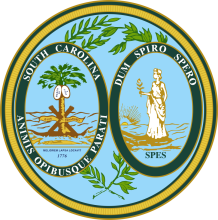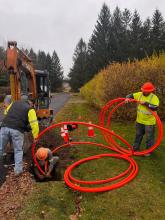
The South Carolina Broadband Office (SCBBO) has announced 56 newly funded projects through its new broadband grant program, which state leaders say will dramatically improve resident access to affordable, next-generation broadband networks statewide.
South Carolina historically hasn’t been a hotbed of community broadband deployment, and is one of 17 states that have passed restrictions on municipal network creation, funding, and expansion. Still, there are numerous electric cooperatives in the state busy creatively bridging the digital divide that stand to benefit from an historic infusion of new grant funding.
The state’s latest round of funding comes courtesy of South Carolina’s American Rescue Plan Act, State and Local Fiscal Recovery Funds Priority 1.0 program (ARPA SLFRF 1.0).
All told, the SCBBO says it has doled out $129.6 million in broadband grand awards to 15 different Internet service providers (ISPs) across 34 different South Carolina counties.
“We are incredibly excited about this next chapter of broadband expansion in South Carolina,” Jim Stritzinger, Director of the SC Broadband Office said in a statement. “Across the state, most have probably noticed the ISP road crews working diligently to provide high-speed internet access to our homes and businesses. This set of investments will provide a substantial boost to the work that is already underway.”
According to state officials, All ARPA SLFRF 1.0 grants are required to be completed by December 31, 2024. Once completed, the state says these grants will have funded 5,000 additional miles of fiber statewide as well as last mile access to at least 38,995 locations.
In 2021, the South Carolina General Assembly created the Office of Broadband Coordinator within the Office of Regulatory Staff. The goal of the office is to serve as the central broadband planning body for the state, coordinating with federal, state, regional, local, and private companies to expand affordable broadband access statewide.
The SC Broadband Office then set about creating the Broadband Advisory Council to help further guide broadband planning in South Carolina.

In May 2022 the state then passed Act 244, which doled out $400 million to the broadband office using funds from both the federal American Rescue Plan Act State and Local Fiscal Recovery Fund ($214,234,345) as well as the Capital Projects Fund ($185,765,655).
The U.S. Department of the Treasury formally approved the Capital Projects Fund grant awards on March 7. Those funds should help deliver affordable broadband to an additional 31,000 households and businesses, and Treasury Department guidance states all grant winners must participate in the FCC’s Affordable Connectivity Program (ACP).
An interactive map of all state investments to date can be found here, while state leaders have broken down the results of their own broadband mapping efforts here.
Hundreds of thousands of South Carolina residents lack access to any affordable broadband whatsoever, with millions more stuck with expensive broadband that fails to even meet the FCC’s minimum definition of broadband service (currently twenty-five megabits per second (Mbps) downstream, 3 Mbps upstream).
According to FCC data (which historically understates the problem), less than 40 percent of South Carolina residents have access to fiber-based broadband, and just half of all state residents have access to a broadband plan that costs $60 per month or less.
While state leaders have routinely expressed their devotion to bridging the state’s long standing digital divide, the state has been a hotbed of anti-community broadband legislation ghost crafted by local telecom monopolies. Pressured by AT&T, the state in 2012 passed legislation making it extremely difficult to build or expand municipal broadband networks.
Inline image of South Carolina state house courtesy of Flickr user jpellgen (@1179_jp), Attribution-NonCommercial-NoDerivs 2.0 Generic (CC BY-NC-ND 2.0)







